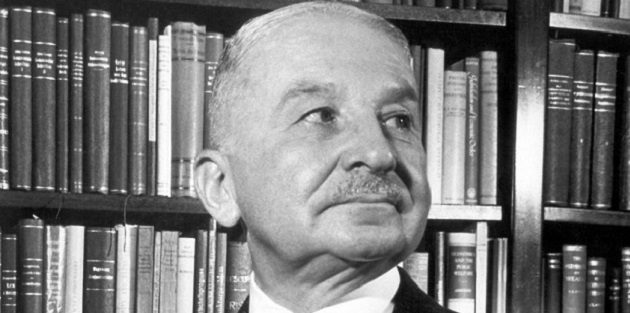In Praise of Peace: Happy Birthday, Dr. Mises by Robert P. Murphy
The great Austrian economist Ludwig von Mises was born September 29, 1881, making today the 133rd anniversary of his birth. I thought it would be fitting for Anything Peaceful to commemorate this extraordinary thinker’s writings in praise of social cooperation.
Although Mises rejected the idea of natural rights in favor of a cool utilitarianism, he nonetheless was one of the most principled champions of classical liberalism. For Mises, social bonds were upheld not by mere emotional yearnings or even biological urges. No, they were due to empirical facts about production and the ability of human reason to grasp these truths about the world.
Specifically, labor was more productive under the division of labor; it was a simple fact that when one man specialized in growing crops and the other specialized in making shirts, both men ended up with more food and clothing. But for people to seize these gains, they needed private property and the possibility of trade.
So far it may seem as if Mises is merely echoing standard results. Yet Mises pushed the analysis much deeper. He thought that civilization itself rested on these empirical facts and their mental recognition among enough people. The traditional rules of morality ultimately derived from these principles, according to Mises. To allow anti-social behavior (such as murder or theft) threatened the division of labor and hence society itself.
Throughout history many writers have celebrated war as an expression of power and national prestige. Mises would have none of it. Indeed he would often write passages that would sound “soft” if they hadn’t been penned by a man who was an officer in the Austro-Hungarian artillery in World War I and fled Nazi persecution later in life. Here is Mises explaining the relative virtues of war and peace:
[An author] errs if…he asserts that “true” civilization and the “good” society are an achievement of people blithely indulging in their passion for violence, murder, and cruelty, that the repression of the impulses toward brutality endangers mankind’s evolution and that a substitution of barbarism for humanitarianism would save man from degeneration. The social division of labor and cooperation rests upon conciliatory settlement of disputes. Not war, as Heraclitus said, but peace is the source of all social relations. To man desires other than that for bloodshed are inborn. If he wants to satisfy these other desires, he must forego his urge to kill. He who wants to preserve life and health as well and as long as possible, must realize that respect for other people’s lives and health better serves his aim than the opposite mode of conduct. [Human Action, Scholar’s Edition, pp. 172–173.]
On this anniversary of his birth, let us celebrate not only the great economics of Ludwig von Mises, but also his abhorrence of war and appreciation for peace.
 ABOUT ROBERT P. MURPHY
ABOUT ROBERT P. MURPHY
Robert P. Murphy has a PhD in economics from NYU and the author of The Politically Incorrect Guide to Capitalism. He is the Senior Economist with the Institute for Energy Research and a Research Fellow at the Independent Institute.


